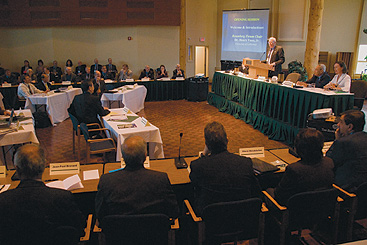
The ICPDR in the spotlight
Attention from the international community has recently focused onthe Danube River Basin and in particular the work of the ICPDR as asuccessful role model for organising cooperation in international river basins.

The Rosenberg International Forum presented the ICPDR and the International Joint Commission as models that could be used to assist the cooperation in other international river basins.
The Danube River and the work of the ICPDR have in recent months figured prominently in a number of important international meetings addressing international river basin management and is increasingly being viewed as a positive example of how to organise cooperation in an international river basin.
It is hard to imagine a river with a volume 20 times that of the Danube, but the Amazon has exactly that. The Religion, Science and Environment Symposium was held this July in Manus, Brazil, on the Amazon River. Over 200 scientists, policy makers and religious leaders gathered for a seven-day journey on the Amazon to explore the river and discuss aspects of river basin management and in particular climate change and the intimate connection between the river, the rainforest and global warming. The conference was organised under the auspices of the Ecumenical Patriarch of the Orthodox Church and Kofi Annan and is the sixth in a series of meetings focusing on the problems of the world’s waters. In 1999 the third symposium focused on the Danube River.
Parallels with the Amazon. The ICPDR was featured at the symposium as a case example of river basin cooperation and was included in a panel addressing the rivers of the world, joining representatives of the Murray Darling in Australia, the Yangtze and the Ganges. While there are clearly many differences between the Danube and the Amazon, there was significant interest in the organisational structures as a basis for future efforts in the Amazon. The Amazon, like the Danube, has a large number of countries in its watershed, eight in total. Only recently have efforts begun to coordinate the work of the countries through an international commission.
The ICPDR’s work sets an example. The Danube was also highlighted in another international event in Banff, Canada, in September. The Rosenberg International Forum on Water meets every two years and brings together scientists and policy makers from river basins throughout the world. A final panel focusing on management arrangements highlighted the International Joint Commission (IJC) – the bi-national commission on water issues between Canada and the US – and the ICPDR. The IJC is one of the oldest mechanisms for international cooperation dating back to 1909 and provides a number of important parallels to the ICPDR.
The IJC and the ICPDR are “among the most effective in the world in the management of transboundary waters and their lessons of success will have broad applicability to transboundary waters throughout the world. Their successes will be of continuing interest to the 55 people from 27 countries who participated in this year‘s Forum,” said Henry Vaux, chair of the Rosenberg International Forum.
Disclaimer
The information contained in the ICPDR website is intended to enhance public access to information about the ICPDR and the Danube River. The information is correct to the best of the knowledge of the ICPDR Secretariat. If errors are brought to our attention we will try to correct them.
The ICPDR, expert group members, nor other parties involved in preparation of information contained on this website cannot, however, be held responsible for the correctness and validity of the data and information provided, nor accept responsibility or liability for damages or losses arising directly or indirectly from the use of the information conveyed therein.
Only those documents clearly marked ICPDR documents reflect the position of the ICPDR.
Any links to other websites are provided for your convenience only. The ICPDR does not accept any responsibility for the accuracy, availability, or appropriateness to the user's purposes, of any information or services on any other website.
When using the information and material provided on this website, credit should be given to the ICPDR.
